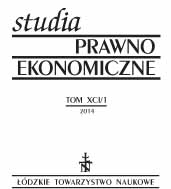Fikcje prawne w nowożytnym common law na tle sporów kompetencyjnych z udziałem sądów westminsterskich
The Legal Fictions in the modern Common Law – the Jurisdictional Competition among the Westminster Courts
Author(s): Jan HalberdaSubject(s): Law, Constitution, Jurisprudence
Published by: Łódzkie Towarzystwo Naukowe
Keywords: legal history; England; English law; common law; legal fictions
Summary/Abstract: Starting with the Middle Ages, the system of writs (forms of actions) began to dominate the English law. Like Roman actiones which may be regarded as equivalents of writs, thus also the latter allowed to determine the circumstances in which an individual was guaranteed to protection of law. The list of writs was exhaustive while the law was considered to be something that was not subjected to changes. Therefore the legal fictions were found to be the only mechanism that made it possible to adapt the common law to the evolving socio-economic circumstances. Thanks to these fictions the parties involved in the litigation could reach the objectives that they desired and that otherwise (without resorting to the fiction) might be unattainable by them. The exploitation of the fiction consisted in the invoking by the trial participant the circumstances that notoriously were not true, the adversary party being simultaneously prevented from proving the opposite. In the course of time the fictions became a characteristic feature of the common law. It was thanks to their application that in the 15th through 17th centuries the scope of the Westminster courts’ jurisdictional competence became enlarged. The fictions enabled these courts to settle matters that originally were beyond the scope of their jurisdiction. The application of fictions resulted also in the broadening of the scope within which the particular writs could be resorted to. This consequently led to the extention of legal protection to the situations with respect to which the earlier common law proved helpless for the lack of any legal remedy.
Journal: Studia Prawno-Ekonomiczne
- Issue Year: 2014
- Issue No: 91/1
- Page Range: 7-22
- Page Count: 16
- Language: Polish

